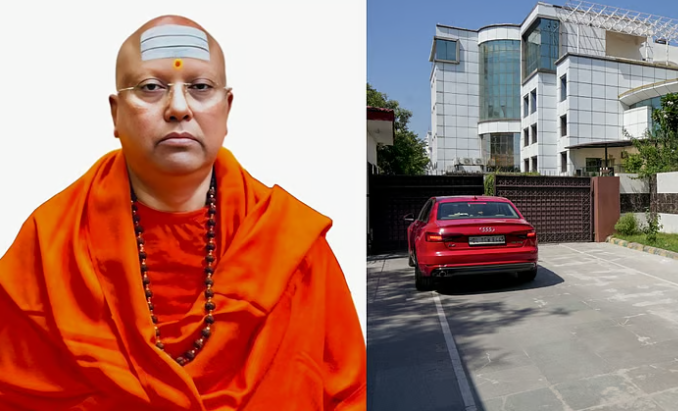Delhi’s Spiritual Scandal: ‘Godman’ Swami Chaitanyananda Under Fire for Allegations and Fraudulent Claims
Delhi Police recently apprehended Swami Chaitanyananda Saraswati, a self-proclaimed spiritual leader, from a hotel in Agra, where he was reportedly staying under the alias Parthasarathy. The arrest stems from serious allegations of sexual harassment against students at the Sri Sharda Institute of Indian Management. Compounding the controversy, authorities discovered fake visiting cards identifying him as both a Permanent Ambassador to the United Nations and a member of the BRICS Joint Commission, raising questions about his legitimacy and intentions.
The incident first gained traction on Saturday night when police detained Chaitanyananda in connection with accusations involving female students pursuing a postgraduate diploma at the institute. According to reports, the arrest followed a complaint filed on August 4. The complainant, an administrator at the Sri Sharda Institute, detailed instances of inappropriate conduct that prompted an investigation by Delhi Police.
Eyewitnesses at the Agra hotel noted that Chaitanyananda arrived at around 4 PM on Saturday. Bharat, the hotel receptionist, confirmed that no visitors came to see him during his stay. He recalled that two men, identifying themselves as inspectors from the Delhi Crime Branch, arrived at approximately 3:30 AM and spent ten minutes in conversation with Chaitanyananda before taking him into custody.
Timeline of Allegations and Discovery
The complaint against Chaitanyananda accuses him of sexually harassing students enrolled in the Economic Weaker Section (EWS) scheme at the Sri Sharda Institute. A thorough investigation led to statements being collected from 32 female students, with 17 reporting various forms of harassment, including inappropriate messages and physical contact. Some students alleged that faculty and administration members coerced them into silence, further complicating the situation.
The police filed an FIR against Chaitanyananda on September 23, based on the gathered evidence and testimonies. The charges not only highlight the sexual harassment claims but also point to the fraudulent credentials he allegedly used to assert authority and influence. The Sri Sharada Peetham, a significant religious institution in India, has since revoked the Powers of Attorney granted to him in 2008, indicating a serious breach of trust and authority.
The Impact of False Credentials
The discovery of the forged UN and BRICS visiting cards adds another layer of deception to Chaitanyananda’s case. Such documents can lend credibility to individuals in the eyes of the public, allowing them to exploit their positions for personal gain. The ramifications of these actions extend beyond individual victims to affect trust in religious and educational institutions. As discussions around the abuse of power and fraudulent practices continue, the need for transparency and accountability in such organizations is more critical than ever.
Notably, the BRICS nations—Brazil, Russia, India, China, and South Africa—are prominent on the global stage, and an association with them could significantly enhance one’s profile. The implications of falsely claiming such affiliations can mislead the public and potentially enable further exploitation.
With the increasing focus on sexual harassment in educational and religious settings, this case presents an opportunity for broader discussions about systemic issues within these institutions. As more students come forward, the spotlight shines on the protective measures that institutions must implement to safeguard vulnerable individuals and promote a culture of accountability.
Victim Support and Institutional Responsibility
In light of the serious allegations against Chaitanyananda, victim support becomes crucial. Educational institutions play an essential role in providing a safe environment where students feel secure enough to report incidents of harassment. The Sri Sharda Institute of Indian Management must evaluate its policies to ensure they adequately protect students and empower them to speak out without fear of reprisal.
Moreover, this scandal raises questions about the due diligence of organizations when granting recognition or titles to individuals claiming significant affiliations. Institutions must thoroughly vet individuals’ backgrounds to prevent fraudulent claims from undermining their credibility.
Investigation and Charges Ahead
As the legal proceedings advance, Chaitanyananda is expected to be presented in court today. The Delhi Police have made it clear that the investigation will continue until all allegations have been thoroughly addressed and all victims are heard. The case has already stirred significant media attention, and public interest in the proceedings is likely to grow.
According to a report by The Times of India, the police are likely to seek more information and testimonies from witnesses, including staff and students at the Sri Sharda Institute. This will help to build a comprehensive picture of the alleged misconduct and the environment that may have allowed such acts to occur.
Broader Implications of the Case
As this case unfolds, its broader implications could influence discussions surrounding the intersection of spirituality, authority, and accountability. The need for vigilance against fraudulent claims in both religious and educational contexts is paramount. This incident serves as a stark reminder that even individuals in positions of supposed moral authority may not always act ethically.
Moreover, the collective response from the community, educational institutions, and the legal system will play a pivotal role in shaping how similar cases are addressed in the future. What remains crucial is that victims feel supported and empowered to speak out, fostering an environment where harassment is not tolerated and accountability is prioritized.
As the investigation continues, it is clear that this case will resonate beyond the immediate allegations, igniting conversations about trust, ethics, and the systems that govern behavior in society.
For more information on the ongoing investigation and updates, you can revisit Hams Live News or explore related articles regarding sexual harassment policies in educational institutions. These discussions are essential as we work toward creating safer environments for all individuals, particularly those in vulnerable positions.


